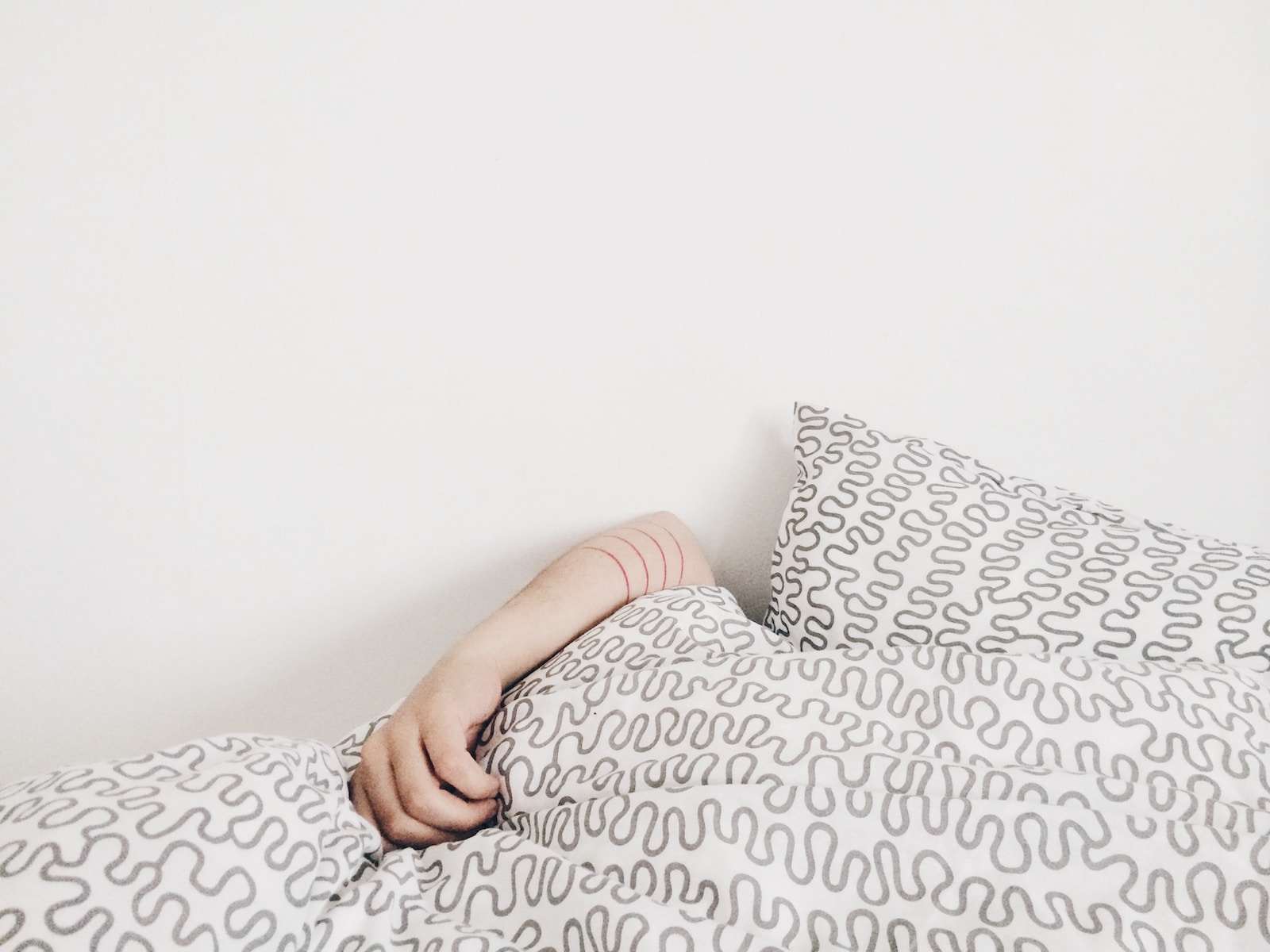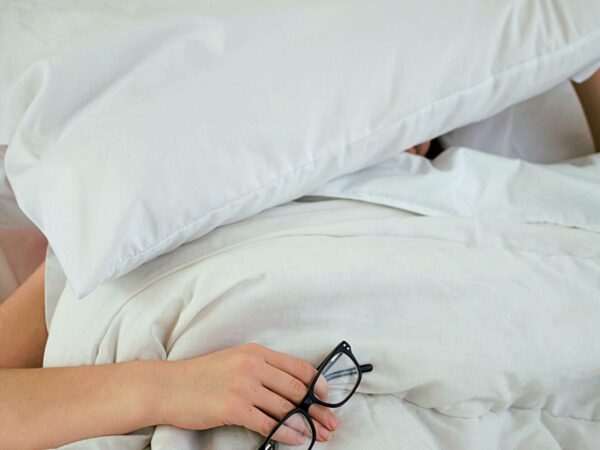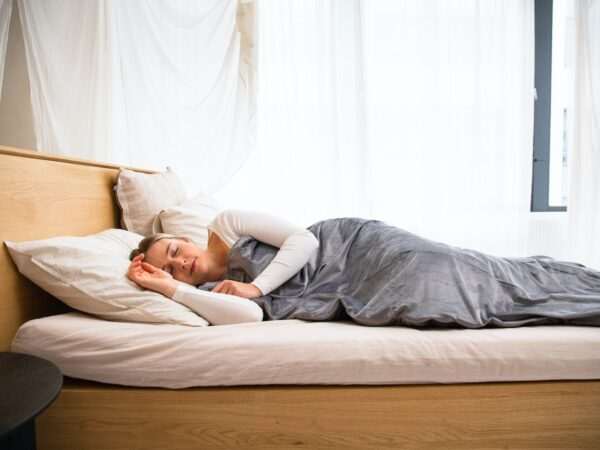Summary. Good sleep is essential for a healthy life. It helps us stay focused, energized and makes us more productive every day. Unfortunately, poor quality sleep is increasingly common and can lead to a range of health issues. To improve sleep quality, a range of lifestyle changes can be made, such as exercising regularly, avoiding caffeine and other stimulants later in the day, creating a relaxing bedtime routine, limiting technology use in the bedroom, and avoiding large meals close to bedtime. Making these simple changes can lead to an improved sleep quality and greater health all round.
Are you having trouble sleeping at night? Do you need help improving your sleep quality? If so, you’ve come to the right place! In this blog post, we’ll explore ways to ensure you can get the rest and rejuvenation you need each night.
So if you’re ready to learn more about how to improve your sleep quality, let’s get started! Getting a good night’s sleep is essential for your mental and physical wellbeing. Poor sleep quality can have serious implications on your overall health and so it’s important to recognise the need for prioritising sleep.
Here are some key tips to help you get a better night’s rest. First of all, identify any potential causes of sleep disruption. Are there any specific habits or factors that are preventing you from getting the rest you need? Are your sleeping habits healthy enough? What can you do to create a more conducive sleep environment? Questions like these are important to ask yourself before making any changes. Another key step to improving sleep quality is to establish a regular sleep schedule.
Taking Inventory of Your Sleep Habits
Taking Inventory of Your Sleep Habits Quality sleep is not a luxury, it’s a necessity! If you’re struggling to get enough restful sleep each night, or if you just want to boost the quality of your sleep, it’s time to take inventory of your habits. It’s tempting to think that getting better sleep is as easy as simply laying down in bed, but unfortunately, it’s not that simple.
To improve the quality of your sleep, you need to make sure your environment, routines, and habits are all conducive to restful sleep. Take a look at your environment: the room where you’re sleeping should be dark, quiet, and comfortable. Make sure your bedding is inviting and comfortable. Don’t let the temperature of the room get too hot or too cold: an optimal sleeping temperature is around 65 degrees.
Evaluate the light and noise in your environment, and take measures to minimize both. Next, look at your habits. Avoid any sleep-interrupting habits like drinking caffeine, smoking, or playing on your phone before bed. Make sure you’re not eating anything close to bedtime, which can make it hard to fall asleep and stay asleep. Watch what you drink too, as drinking too much fluids can lead to frequent restroom trips at night. Look at the amount of sleep you’re getting each night as well. You need to get enough, but not too much, sleep.
Make sure you’re getting to bed and waking up at consistent times, such as every day and night. Evaluating the quality of your sleep is also essential. If you can, keep a sleep diary to track and review the quality of your sleep. This way, you’ll be able to identify any patterns or problem areas that may be harming your sleep.
After monitoring your sleep for a few nights, you may start to see some imbalances or specific changes you need to make in order to improve your sleep. Making positive changes to your sleep habits can make a world of difference in your overall wellbeing. With just a few changes to your environment, habits, and the amount of sleep you’re getting, you’ll be able to start sleeping much better each night. Take inventory of your sleep habits and make the adjustments that are necessary for better sleep.
Identifying the Causes of Poor Sleep

Sleep is essential for optimal physical and mental health: restful sleep helps us function during the day and repair our bodies at night. Unfortunately, millions of people suffer from poor sleep due to a variety of factors, from lifestyle and diet choices to chronic health problems.
In order to improve sleep quality, it’s important to identify and address the causes of poor sleep in order to restore restful, refreshing sleep. One of the most common causes of poor sleep is a disrupted circadian rhythm, or our body’s internal clock. When this clock is not regulated properly, it leads to difficulty falling asleep and staying asleep, as well as daytime fatigue. These issues can be caused by jet lag, working night shifts, or simply staying up too late.
Establish a bedtime routine to help signal the body to start getting ready for sleep. Another cause of poor sleep is inadequate sleep environment. If a person’s bedroom is too hot or cold, too bright, or too noisy, it can prevent them from getting adequate sleep. To ensure an ideal sleep environment, one should keep the temperature cool, darken the room with blackout curtains or an eye mask, and use a white noise machine or fan to block out environmental noise. Eliminating distractions such as screens from your bedtime routine can also be beneficial. Some medical conditions can affect sleeping patterns as well.
Treatment options depend on the particular condition, but may include lifestyle changes, medication, or therapy. Finally, certain behaviors can also lead to poor sleep. Misuse of alcohol, caffeine, or nicotine can disrupt the body’s internal clock and sleep process, leading to sleep disturbances. Additionally, practicing poor sleep hygiene—including using screens or eating too close to bedtime—can have negative health consequences and lead to difficulty sleeping. Establishing healthier habits can lead to better sleep quality.
Setting Goals for Better Sleep Quality

Whether it’s anxiety, stress, or the distractions of the many digital devices that are constantly vying for our attention, setting ourselves up for healthy sleep habits can be a challenge. But, creating good sleep habits doesn’t have to be difficult. Setting goals for better sleep quality is key to improving your sleep. It’s important to understand how much sleep you need in order to be productive and alert during the day.
Setting a goal to get 7-8 hours of sleep each night, and sticking to that goal, is an essential step in improving your sleep quality. In addition to creating a goal of guaranteed hours of sleep, it’s important to understand what it looks like for your body to achieve restful sleep each day. This means no digital devices in the bedroom, limiting caffeine intake in the afternoons, and going to bed and waking up at the same time each day.
Creating a relaxing routine before bedtime can also have a significant impact on your sleep quality. Turning off all electronic devices an hour or two before bed, reading a book or magazine, or listening to ambient tunes can help put your mind and body in the right mindset for sleep.
Making a to-do list for the following day can help to quiet the mind and clear away any anxieties that can impede you from getting solid rest. Creating a goal of getting 7-8 hours of sleep each night and adhering to a relaxing pre-bedtime routine can lead to improved sleep quality.
Even making small changes such as avoiding caffeine intake after lunch and limiting blue light exposure an hour before bed can make a big difference. Taking simple steps towards improving your sleep can help you achieve a better sense of well-being and increase your productivity during the day.
Practicing Healthy Behaviors for Optimal Sleep

Finding ways to get quality sleep is essential, especially during times of increased stress. While having an ideal sleeping environment is key, it is also important to practice healthy behaviors to ensure you are getting enough restful sleep. Making small changes to your daily routine can help you improve your sleep quality and feel better during the day. Here are a few tips to help you improve your sleep quality: First, establish a consistent sleep schedule. Having a consistent sleep routine allows your body to get used to going to bed and waking up at specific times, thus helping you to get the needed amount of rest each night.
Second, exercise regularly. Exercising can help promote physical and mental well-being, while also putting your body in a relaxed state, which can help you sleep better. Make sure to schedule your exercising at least 3-4 hours before bedtime, and aim for 30-60 minutes of moderate physical activity like running, yoga, or a brisk walk. Third, avoid naps during the day. Although a quick nap in the afternoon may seem like a good way to catch up on sleep, it can prevent you from falling asleep at night.
Choosing the Right Mattress and Pillow

It’s important to be well rested so that our bodies can recover and produce energy while we’re awake. The right mattress and pillows are an essential part of getting a good night’s sleep. Finding the right mattress and pillow for you can be a daunting task, but it doesn’t have to be. By following these easy steps, you can select the best mattress and pillow to improve your sleep quality and get the rest you need. First, consider the type of mattress you want.
Innerspring mattresses are more durable, but they won’t provide the same comfort level as memory foam mattresses. It’s important to find the type of mattress that is best for your individual needs. Next, evaluate the thickness of the mattress. If you’re a lighter person, you might want to go for a thinner mattress that’s easier to move around and will better accommodate your body shape. Heavier people might want a thicker mattress for added support and comfort. Finally, your pillow choice is also important.
Pillows made of foam are good for those who need neck and shoulder support, while feather pillows are better for those who like extra cushioning. It’s also important to consider the size of your pillow and make sure it isn’t too high or too low.
Dealing with Stress to Improve Sleep

Many people struggle with sleep issues due to stressful events in their life. This can include things like overworking, financial stress, the current pandemic, and even life changes such as a new job or moving.
The first thing to do is to identify the stress-inducing issues in your life and take steps to address them. This can mean talking to your employer, financial advisor, or doctors about your stressors. It also means being realistic about what you can and can’t change.
It’s important not to overlook even small changes that can make a big difference, like changing your eating and sleeping habits or adjusting your spending habits. Once you’ve identified and addressed your stressors, the next step is to look at how you can bring more relaxation into your life. This can be done through things like yoga, meditation, deep breathing exercises, and listening to calming music.
It’s important to create a sleep routine that works for you. Make sure to go to bed and wake up at the same time each day and eliminate screens an hour before bed. Create an environment that is conducive to good sleep, such as keeping your bedroom dark and cool and using gentle sheets and blankets. Taking the time to create a schedule and environment that works for you can make all the difference when it comes to getting a good night’s sleep.
Examining the Impact of Light & Noise on Sleep

In fact, the way our bedroom environment is organized can be one of the single most important factors influencing how well we sleep at night. Even the smallest amount of light or a little bit of noise can disturb our sleep, making us feel irritated and unfocused the next day.
Therefore, it is important to create the best possible environment for sleep – one that helps us to relax, restore our energy, and wake up feeling refreshed and well-rested. Here are some tips for creating an ideal sleep environment that will help maximize your sleep quality: First of all, it is critical to limit the amount of light entering your bedroom. Remember that even if you can’t see any lights, they could still be affecting you.
Additionally, the materials you use to decorate your bedroom and the colors you choose for the walls and other elements can also help or hurt the quality of your sleep. Stick with muted shades and cool colors, as warm colors often trigger anxious or unrestful feelings. Next, it is also important to limit noise in your bedroom.
Use heavy curtains or soundproofing blankets to reduce the amount of noise from the street or other parts of the house. If you are a light sleeper, invest in a set of earplugs that you can use to block out sounds. Additionally, device alarms and notifications can be a real distraction when it comes to getting a good night’s sleep.
Evaluating the Effectiveness of Sleep Aids

Unsurprisingly, those who struggle to get enough sleep can be at risk of health problems and reduced productivity. There are many sleep aids available, but how do you know if they are really effective? In this article, we explore the various methods used to evaluate the effectiveness of different types of sleep aids, so you can make an informed decision about which product is right for you.
When selecting a sleep aid, the best place to start is by looking at the ingredients. Different ingredients can have different effects on sleep and some may be more suitable for specific individuals. It is important to understand exactly what each ingredient does and the potential side effects, as this can help you decide which product is most suitable. To further investigate the effectiveness of different sleep aids, research studies are often conducted to test their efficacy.
Various measurement techniques are used to evaluate the effectiveness of sleep aids. These can include surveys, questionnaires, heart rate and brain activity monitoring, and sleep logs. Surveys and questionnaires are used to gain an insight into people’s overall sleep patterns and quality of sleep. The responses are then used to evaluate the effect of different sleep aids on sleep quality. Heart rate and brain activity monitoring can provide useful information about the sleep-wake cycle.
These tests measure the amount of time spent in different states of consciousness including light sleep and deep sleep, and provide detailed information about changes in activity levels during sleep. Sleep logs provide a record of people’s sleeping habits over an extended period of time. People can note down when they go to bed, how much time they spend asleep, how long it takes to get to sleep, and any observations about their quality of sleep.
Different metrics can be used when evaluating the effectiveness of sleep aids. These measurements can include changes in time taken to fall asleep, total sleep time, total wake time, quality of sleep, amount of deep sleep, and morning alertness. Sophisticated software is also available to help create individualized sleep plans, including diets and exercise schedules, that can help improve sleep quality.
It is important to be aware of any potential side effects of certain sleep aids, as these can be very serious. Common side effects may include drowsiness, digestive problems, dizziness, and headaches. It is therefore important to always read the label and consult a health practitioner before taking any sleep aid.
Our Final Thoughts
Are you looking to improve your sleep quality? A good night’s sleep is essential for physical and mental wellbeing, but many people suffer from sleep deprivation or insomnia. There are several steps you can take to improve your sleep quality and get a better night’s rest. Getting into a regular sleep routine is key.
Aim to go to bed at the same time each night and get up at consistent times, even on weekends or days off. Create a relaxing and dark environment, free from noise and external distractions. Exercise and physical activity are beneficial in improving sleep quality. Taking regular exercise in the daytime helps to burn off excess energy and can help you to drop off to sleep faster and for longer.
Research has also shown that smokers have lighter and more disturbed sleep, so if you smoke then quitting may help to improve your sleep. Having a comfortable mattress and pillows can also make a significant difference. A comfortable mattress should be supportive without being too hard, and pillows should be chosen for the best support when lying on your side. Herbal teas and relaxation techniques are also useful. Herbal teas such as chamomile can help reduce stress and anxiety and relax the body for a better sleep. Practices such as yoga and Pilates can also help reduce stress and relax the body. Finally, don’t worry about sleep.
Try and relax and if you are still unable to sleep then get up and do something until you’re ready for bed. In summary, there are several steps you can take to improve your sleep quality. Establishing a regular sleep routine, keeping active during the day, avoiding stimulants, and making sure you have a comfortable bed can all help. Additionally, herbal teas and relaxation techniques can help to reduce stress and improve sleep. With these tips in mind, you should be able to get the restful night’s sleep you deserve. Do you have any tips for improving sleep quality? What have you found works for you?
FAQ: All Your Questions Answered
How much quality sleep is enough?
Quality sleep means sleeping progressively deeper and more restoratively, ensuring that the body and brain rest and wake up feeling alert and refreshed.
How do I fix my sleep quality?
- Establish a sleep schedule: Going to bed and waking up at the same times each day will help your body recognize when it is time to go to sleep and when it is time to wake up.
- Reduce alcohol and caffeine intakes during the day: Both caffeine and alcohol can interfere with your sleep quality.
- Exercise regularly: Regular exercise during the day can help you fall asleep more easily.
- Avoid screens: The blue light from screens such as phones and TVs can make it harder to sleep and even impact how deeply you sleep.
- Make your bedroom sleep-friendly: Too much light, noise or clutter can make it hard to fall asleep and stay asleep. Create an environment that is relaxing and comfortable.
- Connect with nature: Spending time outside in nature may help relax your body and mind and improve your sleep quality.
- Try relaxation techniques: Deep breathing, progressive muscle relaxation and guided imagery can help your body and mind get into a state of relaxed readiness before bed.
What worsens sleep quality?
Factors that can worsen sleep quality include stress, caffeine consumption, alcohol consumption, light or noise disturbances, an uncomfortable sleeping environment, medications, and certain medical conditions.
Used Reference Links:
https://www.mayoclinichealthsystem.org/hometown-health/speaking-of-health/5-ways-to-get-better-sleep
https://www.headspace.com/sleep/how-to-sleep-better
https://www.webmd.com/sleep-disorders/ss/slideshow-sleep-tips
https://www.healthdirect.gov.au/blog/how-to-get-a-good-nights-sleep















